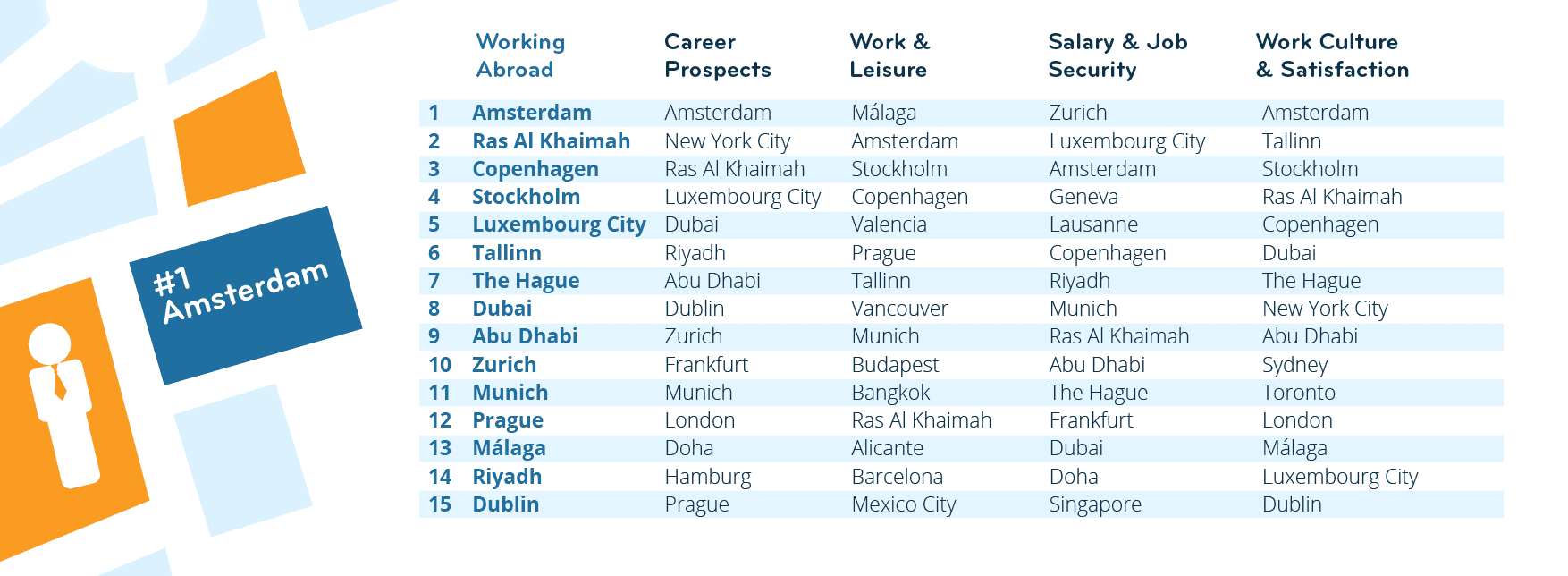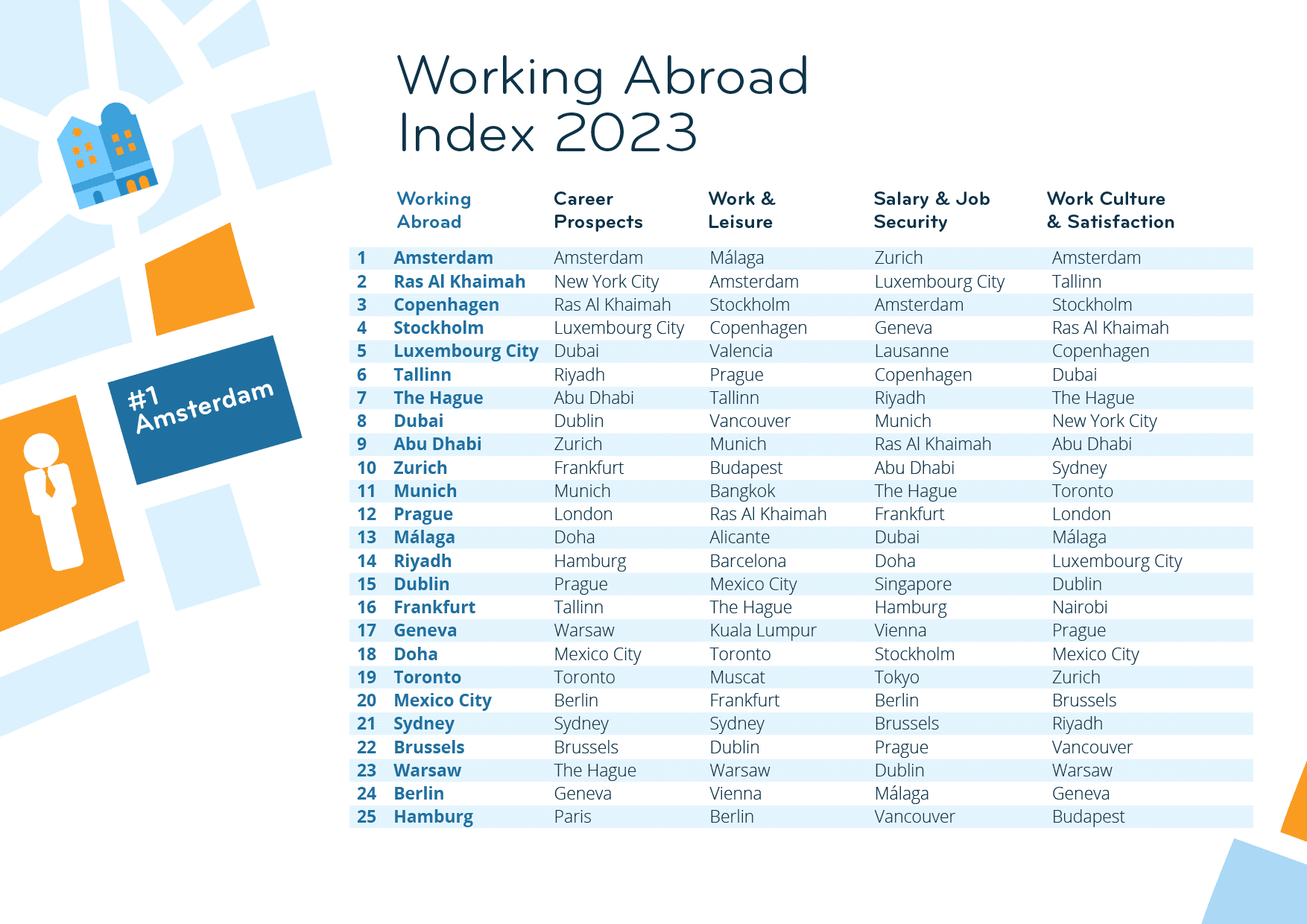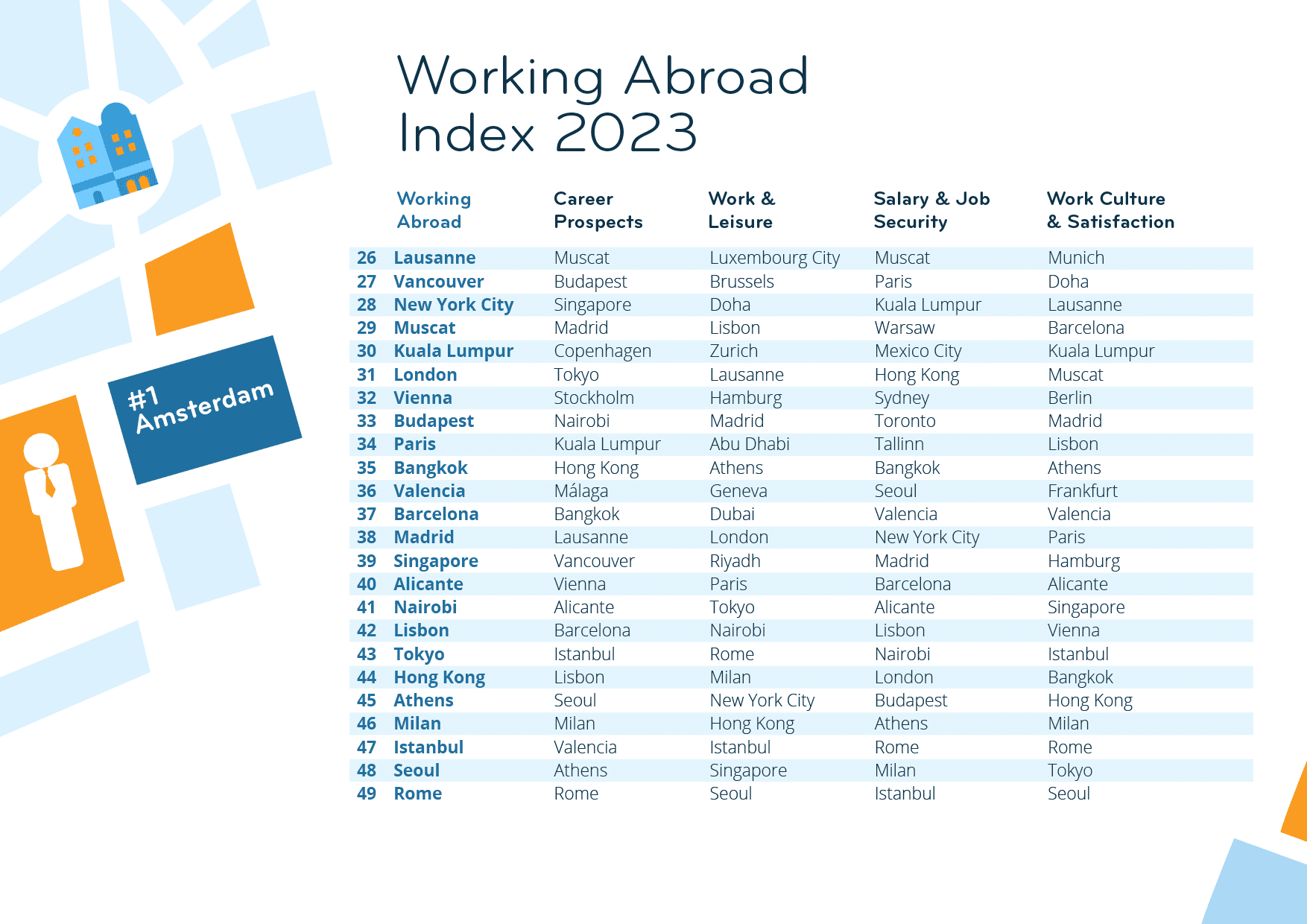Best & Worst Cities for Working Abroad in 2023
From the value of creativity in the local business culture to working hours, fair pay, and job satisfaction: what are the top (and bottom) cities for expats and their careers?
Top Findings
- #1 Amsterdam delights expats across all areas of working life.
- Relocating to #2 Ras Al Khaimah can really improve expats’ career prospects.
- #3 Copenhagen offers a great work-life balance and lots of flexibility.
- Rome (#49), Seoul (#48), and Istanbul (#47) make up the bottom 3.
The Top 15

Methodology
The Working Abroad Index is based on four subcategories with at least two factors each. From the local job market and working hours all the way to how much the local business culture supports flexibility and more — survey participants were asked to rate each factor on a scale of one (very bad) to seven (very good).
In order to make it into the ranking, a city had to have a minimum of 50 respondents. In 2023, 49 cities made this threshold.
#1 Amsterdam Offers an Expat-Friendly Work Culture
With a 1st place out of 49 cities in the Working Abroad Index 2023, Amsterdam has further improved its already good performance of the previous year (7th out of 50). In fact, it makes it into the top 3 of all four subcategories of the index — great news for the above-average share of expats who moved there for their job (46% vs. 35% globally)!
Expats especially love the Dutch capital for their Career Prospects (1st). They rate the local job market the best worldwide, and close to three-quarters (72%) find that the move to the Netherlands has improved their career prospects. Half (50%) even agree completely (vs. 32% globally). It seems hardly surprising then that 79% are satisfied with their personal career opportunities in Amsterdam (vs. 57% globally).
A career in Amsterdam doesn’t have to be at the expense of leisure time, either. “The work-life balance is awesome,” shares a Mexican respondent. Expats are in fact both happy with their working hours (1st) and work-life balance (2nd). With 40.5 hours, their full-time weeks are shorter than the global average of 42.7 hours, too.
The vast majority (84%) can also work remotely at least some of the time, compared to 68% of all respondents. In part, this might be connected to their fields of work: expats in Amsterdam are very likely to be working in IT (24% vs. 13% globally), finance (16% vs. 8%), and advertising, marketing, and communications (10% vs. 5%).
More than nine in ten (92%) further agree that the local business culture supports flexibility (vs. 60% globally), and most find that it promotes independent work (81% happy vs. 46% globally) and creativity (82% vs. 51%), too. Thanks to these results and a high level of job satisfaction (81% vs. 64% globally), Amsterdam ranks 1st for Work Culture & Satisfaction.
Expats further appreciate Amsterdam’s great economy (93% happy vs. 62% globally) and their job security (77% vs. 59%). Only Zurich (1st) and Luxembourg City (2nd) receive even better results in the respective Salary & Job Security Subcategory.
Great Career Prospects in #2 Ras Al Khaimah
A newcomer in the ranking, Ras Al Khaimah has immediately made it into the top 3 of the 2023 Working Abroad Index, ranking 2nd.
It receives its best results in the Career Prospects (3rd) and Work Culture & Satisfaction (4th) Subcategories. In fact, expats rate it the best city worldwide when it comes to their overall job satisfaction (1st). They also appreciate that the local business culture supports creativity (73% happy vs. 51% globally), flexibility (70% vs. 60%), as well as independent work and flat hierarchies (71% vs. 46%).
Over four in five expats (81%) find that relocating to Ras Al Khaimah has improved their career prospects (vs. 59% globally) — that’s good news, as 50% also say work was the main reason for their move (vs. 35% globally). The city even ranks 2nd for personal career opportunities and is only beaten by Amsterdam. The good local economy — 45% give it the best possible rating (vs. only 25% globally)! — surely plays a role here. “It’s a good place for business jobs,” shares a Syrian expat.
Luckily, you don’t have to decide between a career and a good work-life balance in Ras Al Khaimah, either. Two-thirds of expats (67%) are satisfied with this factor (vs. 63% globally), and three-quarters (75%) rate their working hours positively (vs. 64% globally).
A Great Economy Meets Short Hours in #3 Copenhagen
After ranking 1st in 2022, Copenhagen has to be content with a 3rd place in the 2023 Working Abroad Index.
Expats continue to appreciate the Danish capital for their Work & Leisure (4th). An impressive 85% are, for example, happy with their working hours (vs. 64% globally) — 38% even very much so (vs. 28% globally). With an average full-time work week of 39.7 hours, they also work three hours less than the global average (42.7h). “There’s a healthy attitude to work-life balance and a very practical sense of how to organise things,” according to a British respondent.
Copenhagen also remains popular when it comes to the local business culture, which supports flat hierarchies (4th) and flexibility (4th). However, expats’ general satisfaction with their jobs is close to average (67% happy vs. 64% globally), as is their agreement on whether or not they’re being paid fairly (64% vs. 62%).
And while over nine in ten (91%) point out that the state of the economy is good (vs. 62% globally), this doesn’t necessarily translate into a great job market (26th) or high job security (25th). In fact, close to a quarter (24%) are dissatisfied with their personal career opportunities in Copenhagen (vs. 22% globally).
Few Career Opportunities in the Bottom 3
Rome continues to disappoint expats when it comes to work: following a 45th place (out of 50 cities) in 2022, it now ranks last (49th). In fact, the Italian capital receives bottom-10 results across all the underlying factors except one: 69% of expats there at least still see a purpose in their work, even if this result is already notably below average (78%).
The city does particularly badly when it comes to Career Prospects (49th). Just 10% rate the job market in Rome favorably (vs. 47% globally). And more than a third (36%) disagree that moving there has improved their career prospects, twice the global average of 18%. “The job market is very difficult to navigate especially if you are older than your 30s,” a US American points out.
Results in the Salary & Job Security (47th) and Work Culture & Satisfaction (47th) Subcategories aren’t much better. More than twice the global average regard the local economy negatively (38% vs. 17% globally), and only about a third (34%) agree that they’re paid fairly for their work (vs. 62%). It’s hardly surprising then that less than two in five (37%) are actually satisfied with their job in Rome (vs. 64% globally). Interestingly, though, Rome sees a high share of freelancers and self-employed expats (37% of working respondents vs. 11% globally).
Expats in Seoul view their Salary & Job Security (36th) slightly more favorably, but that doesn’t stop the city from ranking second-to-last (48th) in the Working Abroad Index.
The South Korean capital finds itself all the way at the back when it comes to both Work & Leisure (49th) as well as Work Culture & Satisfaction (49th). Close to half the expats (45%) are dissatisfied with their work-life balance in Seoul, and they also work notably longer hours (44.5 hours/week vs. 42.7 globally in full-time jobs). “The work-life balance is rough,” notes a US American.
According to 49%, the business culture also doesn’t allow for much flexibility (vs. 18% globally). This might explain why nearly two-thirds of expats in Seoul (66%) say they cannot work remotely, not even occasionally (vs. 32% globally).
Whether remote or not, career opportunities in general seem scarce: 30% don’t think moving there has improved their career prospects (vs. 18% globally). And only a third (33%) rate the local job market positively (vs. 47% globally).
Istanbul has managed to improve from its last place in the 2022 Working Abroad Index, but its bottom 3 result in 2023 (47th out of 49) is still nothing to write home about. Expats there are particularly dissatisfied with the state of the economy, which more than half (55%) regard negatively (vs. 17% globally). Just 39% rate the job security in Istanbul positively, 20 percentage points less than the global average of 59%.
The city also ranks in the bottom 3 when it comes to Work & Leisure (47th), with less than half (48%) viewing their working hours favorably (vs. 64% globally). Similarly, only 43% are happy with their work-life balance (vs. 63% globally). Nor does there seem to be room for much flexibility: twice the global average disagree that the local business culture in Istanbul supports things like remote work and flexible hours (36% unhappy vs. 18% globally).
All in all, less than half (47%) find that the move to Türkiye has improved their career prospects, compared to 59% of expats worldwide.
Full Ranking


Advertisement
Join InterNations
The community for expats worldwide
Download

